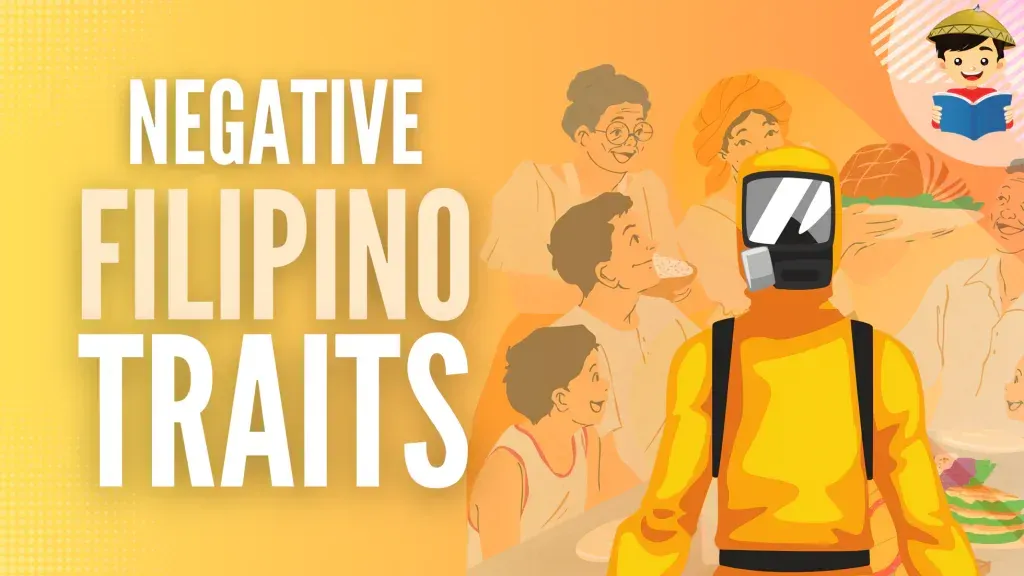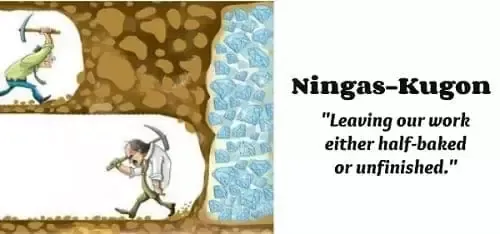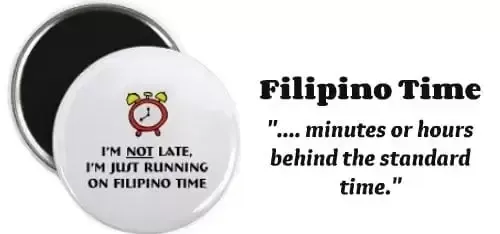
Let’s admit it; at some point in our lives, we have been guilty of one or two (or more) of the negative Filipino traits listed below. Although these negative traits do not diminish the fact that Filipinos are fantastic people, it’s sad that they have continued to pull us down personally and as a nation.
1. Crab Mentality

Simply put, this refers to the behavior of preventing someone from achieving something due to jealousy or envy. Instead of praising or rendering assistance, someone with a crab mentality would think, “if I can’t have it, then you can’t as well,” and will purposely try to bring his/her victim down. And nothing ever gets accomplished, just like the crabs who could have escaped from the bucket if they only stopped pulling each other down.
- Change Required: Develop a mindset of collaboration and encouragement. Instead of pulling others down, celebrate their successes and learn from them. Promote community support and celebrate the collective growth of others as an extension of your own success.
- Actions: Shift from competition to cooperation. Encourage praise and constructive feedback rather than envy and sabotage.
2. Ningas-Kugon

One reason we sometimes exert half-hearted effort in our undertakings is this attitude. Translated to “burning cogon grass” in English, this idiom illustrates how Filipinos exhibit great enthusiasm at the beginning of a project. Our eagerness, however, fades away just as quickly as the fire is extinguished, leaving our work either half-baked or unfinished.
- Change Required: Cultivate consistency and perseverance. Initiatives and projects should be seen through to completion. It’s crucial to maintain enthusiasm and avoid abandoning tasks midway.
- Actions: Set realistic goals, break large tasks into manageable chunks, and maintain momentum by tracking progress regularly.
3. Mañana Habit

Ironically, the Spanish would accuse Filipinos of being lazy when they taught us the mañana habit in the first place. Known as “tomorrow” in English, the practice encourages procrastination, an “ability” we Filipinos have since turned into an art form. Even the most urgent of projects and tasks can be relegated to some other time; we are only forced to work on them when the deadline is near. It’s a miracle we get things done in this country.
- Change Required: Overcome procrastination by emphasizing discipline and time management. Tasks should be completed as soon as possible instead of being delayed.
- Actions: Practice setting deadlines for yourself, prioritize tasks, and focus on completing them one at a time. A “do it now” mentality should be adopted.
4. Filipino Time

Regarding the mañana habit, Filipino time refers to the Filipinos’ unique brand of time, which is minutes or hours behind the standard time. In other words, we tend not to observe punctuality at all. This behavior usually drives time-observant foreigners crazy.
- Change Required: Develop respect for time and punctuality. Timeliness should be viewed as a form of respect for others’ time and commitments.
- Actions: Commit to arriving at meetings or events early. Set alarms, use time-tracking tools, and develop the habit of planning your day with enough buffer time for unexpected delays.
5. Being Onion-Skinned ( Balat Sibuyas )

We Filipinos are famous for being onion-skinned or easily slighted at perceived insults. While it’s perfectly normal for us to taunt and criticize others, we can’t handle the same when it’s being hurled back at us.
Incidents showcasing our extra-sensitivity to insults usually involve a foreigner making either a bonafide racist remark or a humorous jab at us Filipinos. True to form, our reactions range from righteous indignation to excessive grandstanding. While it is alright to feel incensed, throwing a fit in front of the world would inevitably do us no good.
- Change Required: Build emotional resilience and a thicker skin. Learn to accept constructive criticism without taking it personally. Focus on improving yourself rather than being overly sensitive to perceived insults.
- Actions: Reflect before reacting, and differentiate between a helpful critique and a personal attack. Practice calmness and humility in the face of criticism.
6. General Disregard For Rules

Why is it so hard for Filipinos to obey the rules? This social phenomenon is not exclusive to hardened criminals either—a look at everyday life in the country shows Filipinos from the entire social strata nonchalantly breaking the rules, whether as benign as jaywalking or as dangerous as beating the red light.
Also Read: 27 Things You’ll Only See in the Philippines
An interesting theory is that Filipinos’ penchant for law-breaking goes beyond mere lack of discipline or failure to implement the rules. It is something that is ingrained in our very culture. Being oppressed under the yoke of colonization for such a long time made our ancestors defiant of the rules they believed to be discriminatory.
Although such “self-righteous disobedience” may have been alright during their time, the behavior would continue to manifest among the later Filipinos, resulting in an utter lack of respect for the rules.
- Change Required: Foster a culture of lawfulness and responsibility. Respect for rules should be instilled at both the personal and societal levels, from simple traffic laws to more significant regulations.
- Actions: Educate yourself and others about the reasons behind rules. Encourage others to follow the law by setting a positive example. Cultivate a mindset that sees rule-following as a form of collective responsibility.
7. Colonial Mentality

One of the most significant flaws we have as a nation is our colonial mentality, a preference for all things foreign over our own, a negative trait we acquired from our days under the Spanish and the Americans. As a result, we Filipinos have been imbued with the misconception that our culture is inferior to our past colonizers.
- Change Required: Embrace and promote pride in Filipino culture. Dismantle the perception that foreign is inherently better, and instead appreciate and value local products, traditions, and talent.
- Actions: Support local businesses, advocate for Filipino arts and culture, and raise awareness about the importance of national identity.
8. Balikbayan Box Mentality

While there is nothing wrong with giving gifts to one’s family and friends (we Filipinos highly value them), it becomes a different matter when said family and friends misconstrue or abuse the OFW’s generosity.
This has become known as the “Balikbayan box mentality” in local parlance
People ingrained with this mentality either become exploitative or jealous of the success of the OFW, not knowing that he/she is working hard away from their loved ones in a foreign country. Some also believe the practice undoubtedly contributes to the Filipinos’ colonial mentality.
- Change Required: Embrace and promote pride in Filipino culture. Dismantle the perception that foreign is inherently better, and instead appreciate and value local products, traditions, and talent.
- Actions: Support local businesses, advocate for Filipino arts and culture, and raise awareness about the importance of national identity.
9. Bahala Na Attitude

Roughly translated as “come what may,” Filipinos’ version of fatalism is the belief in leaving everything to the hands of fate.
While not inherently detrimental, this attitude is still a double-edged sword. On the one hand, positive aspects of this behavior include belief in Divine Providence and national social responsibility. On the other hand, the attitude can also promote a sense of helplessness and resignation of one’s fate at the local level and a countrywide lack of empathy and collective action on the national level.
This is also why we tend to have amnesia over past wrongdoings committed by our leaders.
- Change Required: While trust in Divine Providence is valuable, this should be coupled with action and responsibility. Instead of resigning to fate, combine faith with practical solutions.
- Actions: Take accountability for your actions, plan for contingencies, and work towards realistic solutions while maintaining hope and faith.
10. Corruption

One of the biggest social ills our country has continued to face since time immemorial is the issue of corruption. Let’s face it, our “culture of corruption” is embedded deep within our system and reinforced by a complex web of economic and social factors, which include personal ambitions and a twisted sense of loyalty to friends and kin. The Philippines is in for a long haul if our officials and we do not eliminate this harmful habit.
- Change Required: Corruption needs to be addressed from both the top-down (institutional) and bottom-up (personal) levels. Eliminate the culture of bribery, shortcuts, and abuse of power.
- Actions: Act with integrity and hold leaders accountable. Support transparency, whistleblowing, and ethical behavior in daily life, from avoiding small bribes to calling out larger injustices.
11. Maintaining Double Standards

This behavior can be observed in just about every sector of Philippine society, with the most common example being the condemnation of an adulterous woman while applauding a polygamous man. On the national scale, we see politicians spouting promises of reform and good governance only to break them. Long story short, some Filipinos are hypocrites to the core.
- Change Required: Promote equality and fairness in all situations. Double standards undermine justice and create division within society.
- Actions: Apply rules equally, whether in the family, workplace, or government. Encourage discussions on gender equality and hold people accountable for the same expectations.
12. Excessive Partying

Now there’s nothing wrong with enjoying a fiesta and party now and then; it’s just that we Filipinos tend to overdo it.
Birthdays, anniversaries, graduations, and even sad funerals are celebrated by Filipinos like there is no tomorrow. Sometimes we even make up the slightest of reasons so that we can have an excuse to party. Moreover, a host would sometimes even strain his finances to impress his guests
As for fiestas, every LGU down to the smallest barangay in the country has a fiesta to celebrate. As we said, it’s alright to party, but we should focus on austerity and working hard first.
- Change Required: While celebration is important, focus on moderation and responsible spending. Cultivate a balance between work and play, making sure that financial security and responsibilities are prioritized.
- Actions: Plan events that don’t strain financial resources. Focus on meaningful, simple celebrations rather than lavish displays, and teach the value of austerity.
General Solutions:
- Education and Awareness: Many of these issues stem from cultural habits passed down through generations. Awareness campaigns and education are key in promoting change.
- Role Models: Leaders, influencers, and everyday citizens can set examples by practicing the opposite of these negative traits.
- Community Effort: Positive change requires collective action. Encourage community-based programs that address these issues, from punctuality initiatives to anti-corruption campaigns.
By addressing these traits collectively and individually, Filipinos can build a stronger, more disciplined, and with effort, these traits can be turned into strengths.Every small action counts. You’ve got the awareness, and that’s already a powerful start! Keep moving forward, and don’t forget that change, even in small steps, brings us closer to our goals.

